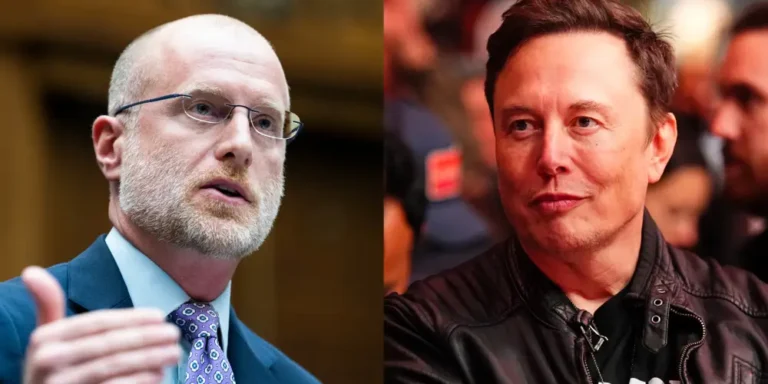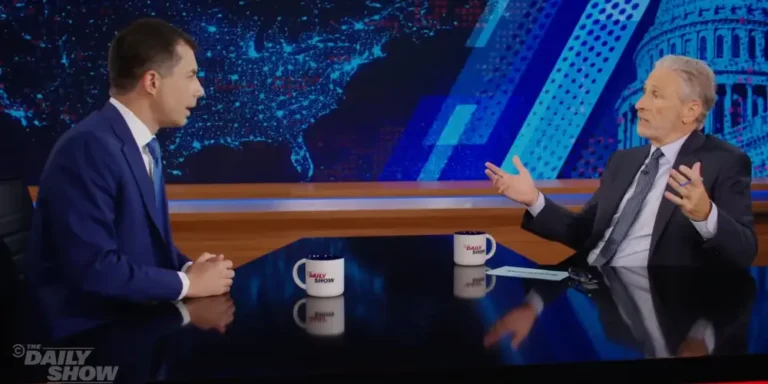‘Fait accompli’: Inside Democratic lawmakers’ paralysis over Biden
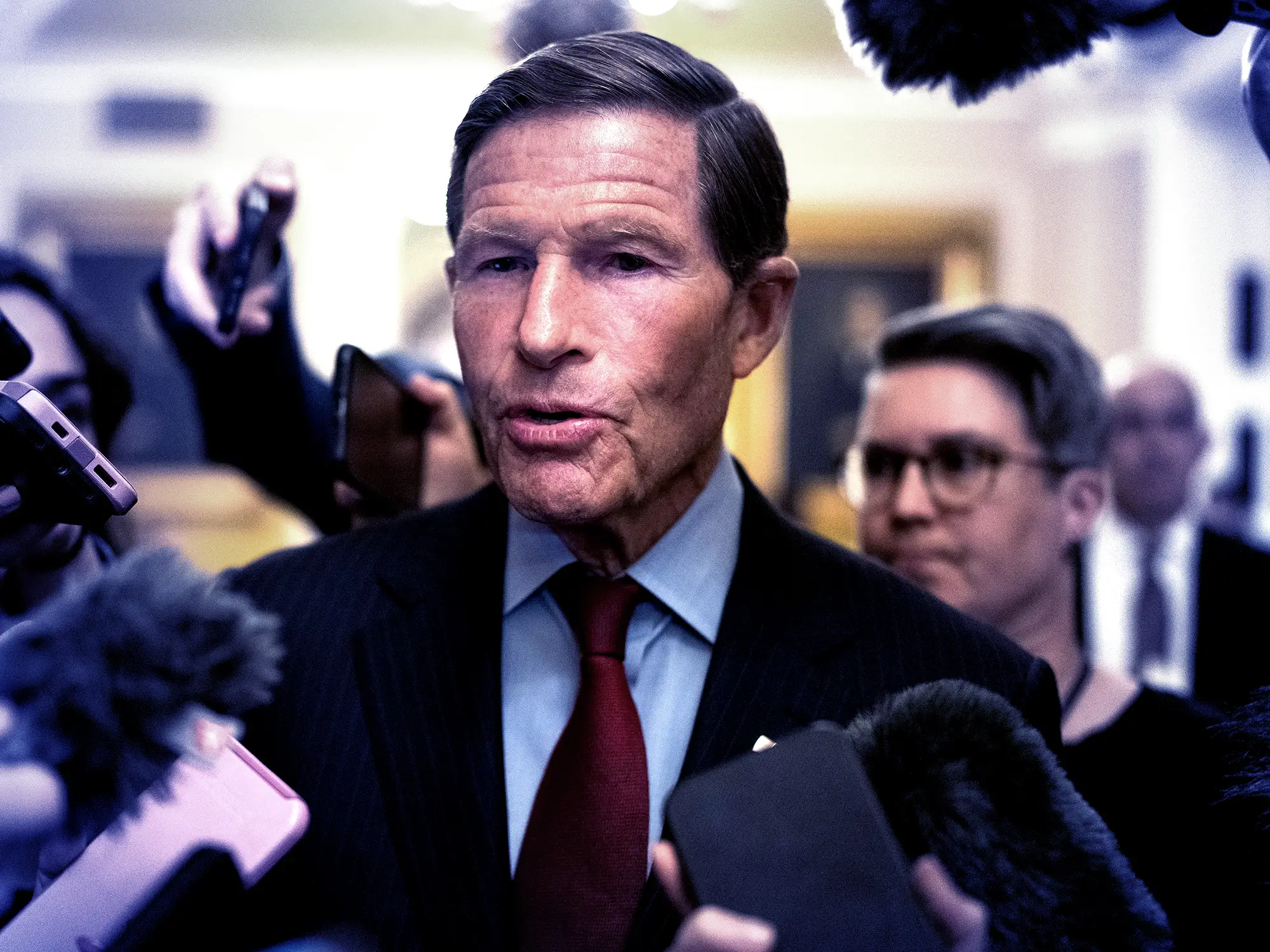
Senator Richard Blumenthal
One by one, Democratic members of Congress began to stream out of the Democratic National Committee’s headquarters on Tuesday morning. Most of them said nothing, offering stone-faced expressions to the more than 60 reporters, some of them from foreign outlets, who had braved the heat and humidity to stake out the closest thing one might get to a “smoke-filled room” in the year 2024.
House Democrats had convened to discuss Biden’s future. That’s why we were outside the sandstone-colored walls of the DNC, where lawmakers can more freely discuss political matters, rather than in an air-conditioned hallway outside the Capitol basement conference room where these weekly meetings typically take place.
Gaggles spilled into a narrow road already clogged with cars prepared to whisk lawmakers away. Cries of “out of the street!” from nearby security officers pierced the muggy July air. It was chaotic. I check the temperature: It’s 86 degrees Fahrenheit. It’s only going to get hotter. “This is the worst stakeout ever,” a photographer exclaims. The sweat starts to flow. One staffer, waiting to pick up their boss, remarks to me that there may be a stench in the hallways of the Capitol later.
Rep. Steve Cohen of Tennessee tells reporters that his colleagues are not on the same page. “We’re not even in the same book,” he barks. Rep. Summer Lee of Pennsylvania dons a pair of large blue headphones, shaking her head as she walks back toward the Capitol. Rep. Mike Quigley of Illinois, one of the few who has publicly called for Biden to go, awkwardly fields questions from at least 20 reporters as he unlocks his bike. Rep. Adam Schiff of California, among the dozens of lawmakers who have publicly raised concerns about President Joe Biden’s viability, slips behind the wheel of a blue Tesla and makes his escape.
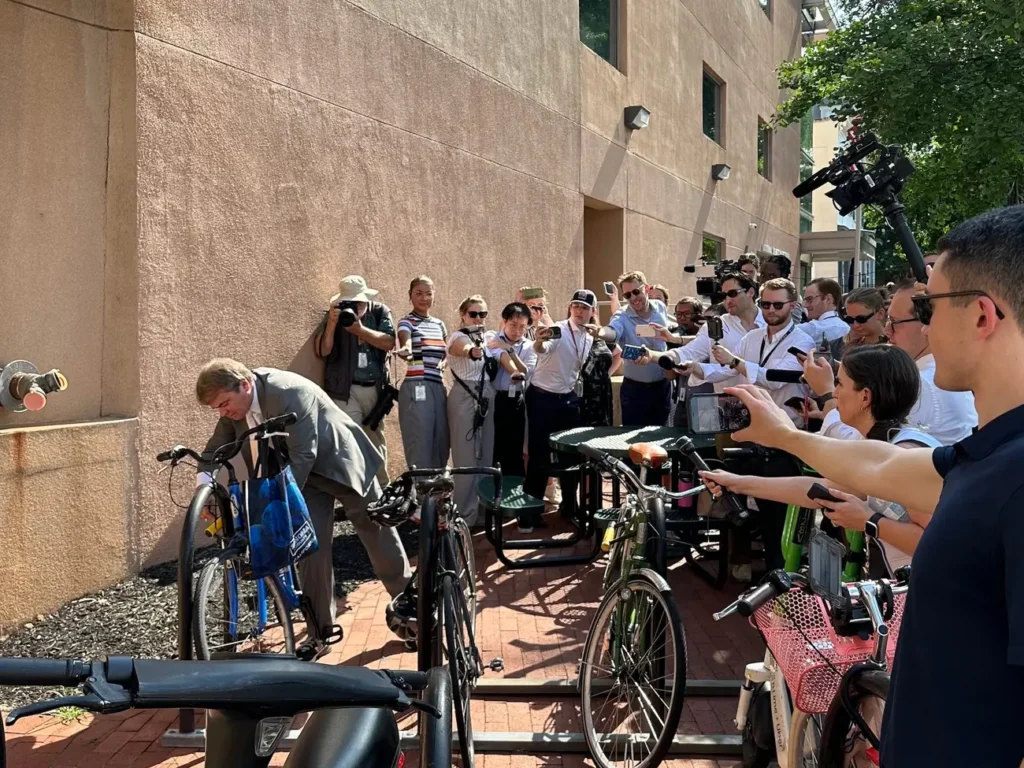
Rep. Mike Quigley fields questions from reporters while unlocking his bike outside the DNC.
If any consensus among lawmakers was immediately apparent, it was that it’s time to pipe down, to stop feeding the press with the public waffling, the embarrassing leaks, and even the anonymous quotes that have filled Capitol Hill reporters’ stories in the days since Biden’s awful debate performance.
“I have heard that repeatedly for the last week: If you feel so strongly about something, put your damn name on it,” one House Democrat, granted anonymity because they’ve all just been told to shut up, told me later on Tuesday.
An uneasy paralysis seems to have set in on Capitol Hill. The number of Democratic lawmakers publicly calling for Biden to withdraw remains in the single digits. The dam that many expected to break remains intact. Scores of Democrats, including members of the influential Congressional Black Caucus, have reaffirmed their support for the president. Another cohort is proclaiming their “concerns” with the president’s candidacy, offering them the necessary wiggling room to fall back in line while offering less-than-clear instructions on how Biden can achieve that. Some are insisting that Biden will “make the right decision” even though he says he’s already made his decision.
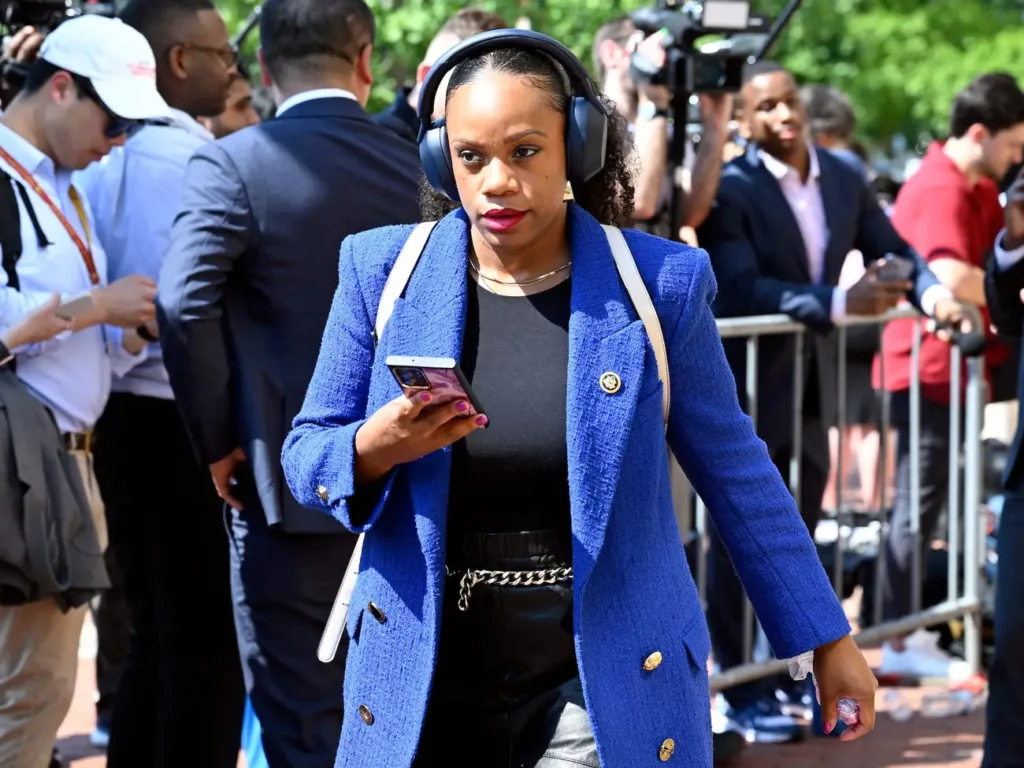
Rep. Summer Lee wears headphones as she departs House Democrats’ meeting at the DNC on Tuesday.
A second House Democrat, also granted anonymity, said that “deep divisions” remain within the caucus over Biden and that a “plurality” of House Democrats would like to see a change to the top of the ticket, but that lawmakers have started to accept that the president won’t step aside.
“People think it’s a fait accompli,” the lawmaker said. “He’s survived. Absent him having a performance again like the debate, he’s going to be the nominee.”
The lawmaker went on to suggest that “they’ll limit him” — “they” being the president’s own campaign staffers and White House deputies — after the conclusion of this week’s NATO summit in Washington, DC. “I think he’ll survive to the convention if he just limits himself, at this point.”
But that’s not what the “concerned” crowd wants. Rep. Greg Landsman of Ohio, an early adopter of that position, told me that he wants to see Biden “off-prompter, calling into radio shows, TV shows, going to rallies, talking to reporters, talking to voters.”
“It is an opportunity that materializes every hour,” Landsman said. “That is where I think the majority of Americans are. They want to understand that the person who is going to be running against Trump can do that.”
Meanwhile, Rep. Dean Phillips, the Minnesota congressman who gave up his seat to wage a quixotic primary challenge against Biden almost exclusively over the age issue, acknowledged that he may have been right, and that some of his colleagues had told him that. Of course, he did it with the appropriate amount of solemnity.
“If this is vindication, vindication has never been so unfulfilling,” Phillips said on the Capitol steps, stopping short of issuing a drop-out call himself.
‘You think he’s made his decision, that can be your opinion’
Hours later on the other side of the Capitol, Democratic senators are gathered in the other proverbial smoke-filled room: Their weekly lunch in the Mike Mansfield caucus room, named for the Montana senator who led the upper chamber as it passed the Civil Rights Act, the Voting Rights Act, and President Lyndon B. Johnson’s “Great Society” programs. The stench I’d been warned about — the distinct miasma of body odor — permeates the Ohio Clock Corridor, just outside the room. One could even say the vibes were rancid. Senate Republican leaders are delivering their weekly remarks to the cameras, at times struggling to be heard over the din. In the throng of reporters and staffers, I spot an aide to a Democratic senator. He appears less than thrilled. “I’d like to walk myself into the sea,” he tells me.
Democratic senators start to file out. Much like their House counterparts, they’re expressionless and mostly unwilling to talk, bolting as quickly as they can from the caucus room to the Senate floor. Much like the crowded street outside the DNC, it’s a bit chaotic. “Clear a path!” yell press gallery staffers.
Senate Majority Leader Chuck Schumer takes to the mics with Sens. Patty Murray and Maria Cantwell, both from Washington state, in tow. The lunch ran 45 minutes longer than usual. The trio spend 10 minutes talking up a trio of abortion-related bills pertaining to abortion rights that the Senate lacks the votes to pass. They’d much rather be talking about this issue than Biden. The assembled reporters, joined by several more TV cameras than usual, struggle to avoid looking impatient.
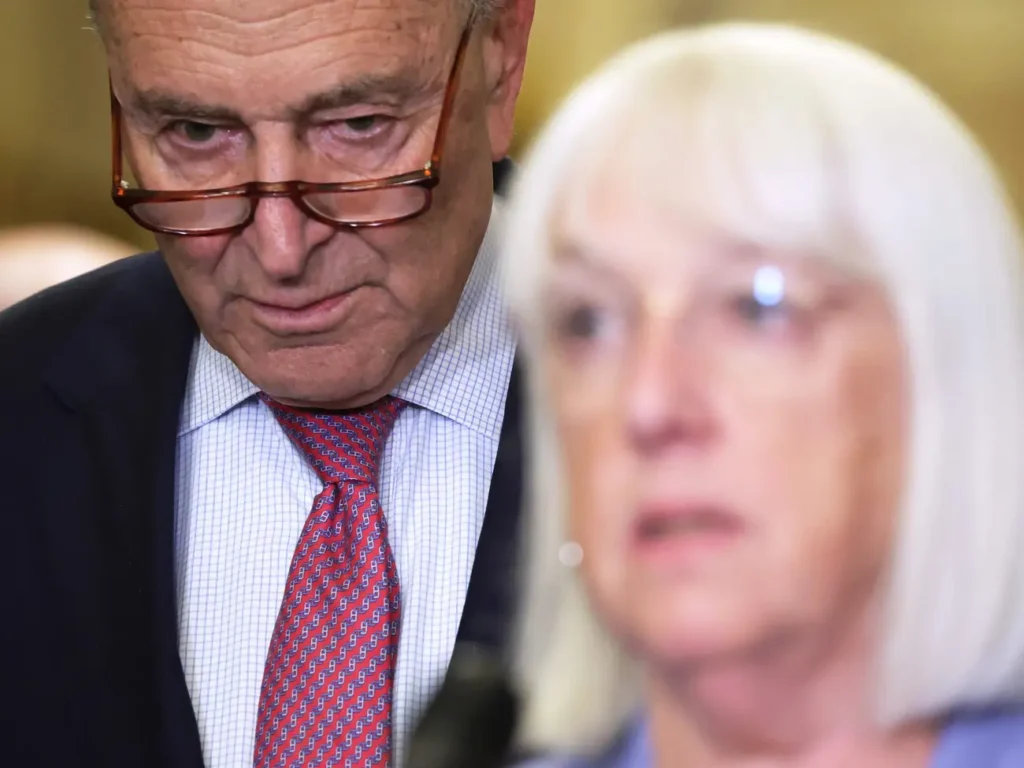
Schumer was asked whether he agreed with Murray’s statement that Biden “must seriously consider the best way to preserve his incredible legacy.”
It’s time for questions. Schumer calls on ABC’s Rachel Scott, saying that he wants “to call on a woman first” since we’re “talking about abortion.” Scott asks if the Democratic leader is confident that Biden can win in November and serve for the next four years. “As I’ve said before, I’m with Joe,” he replies. Schumer reiterates that phrase after two more questions about Biden, including one from CNN’s Manu Raju about whether Schumer agrees with Murray’s Monday evening statement that Biden “must seriously consider the best way to preserve his incredible legacy and secure it for the future.” Murray had conveniently walked away less than 20 seconds earlier. “As I’ve said before, I’m with Joe,” Schumer repeats, ending the press conference after just four questions.
It would later emerge that Sens. Jon Tester of Montana, Sherrod Brown of Ohio, and Michael Bennet of Colorado all said during the lunch that they believe Biden will lose to Trump in November. Bennet went public with his concerns on CNN later that night.
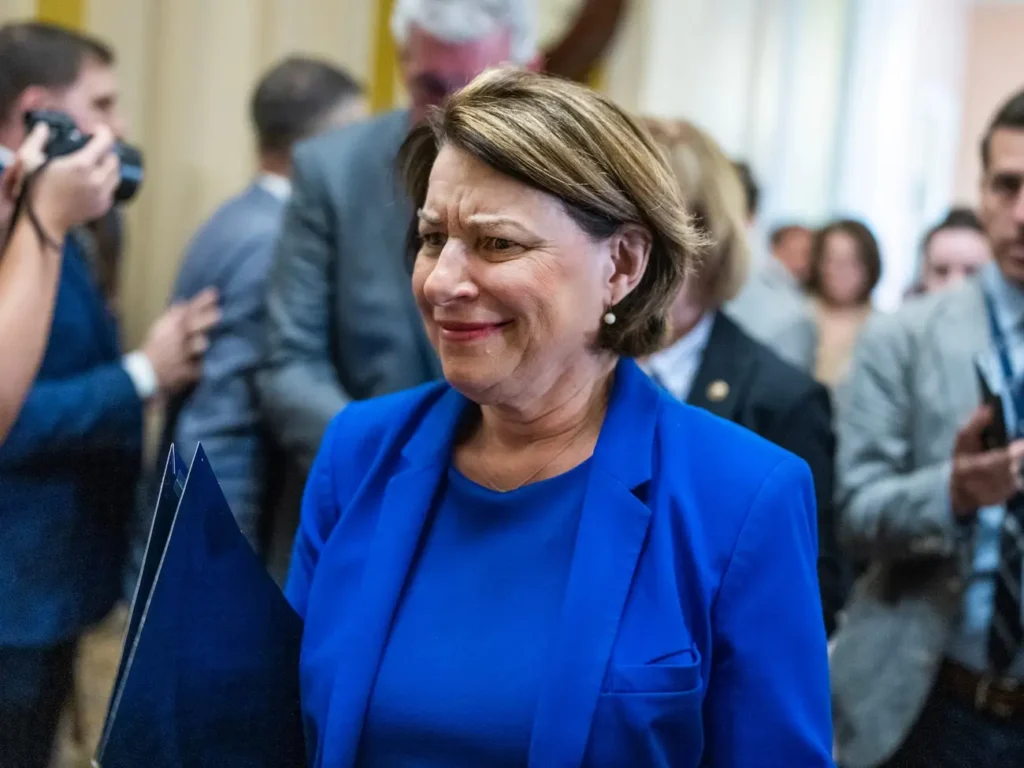
Sen. Amy Klobuchar of Minnesota avoids questions from reporters after lunch on Tuesday.
The truth is, there are no smoke-filled rooms. The Democratic Party is not especially centralized, particularly at this moment. No one can make Biden leave without it being his decision, perhaps as the result of public pressure from majorities of Democrats in each chamber. No one person can really decide what comes after that, whether it’s a coronation of Vice President Kamala Harris or a free vote of the nearly 4,700 delegates to the Democratic convention in mid-August.
The president is dug in, but his political prospects seem to fluctuate by the hour, crashing and soaring on successive days as lawmakers either re-proclaim their allegiance to him or join the ranks of the dissenters. On Tuesday afternoon, hours after House Democrats’ DNC meeting, Rep. Mikie Sherill of New Jersey became the seventh to call for Biden to step down. The discussion on Capitol Hill doesn’t feel quite over. Democrats aren’t taking “no” for an answer.
In the face of the paralysis, an emerging strategy seems to be emerging: Nudge Biden out, but make it look like his decision.
Speaker Emerita Nancy Pelosi took this tack on MNSBC on Wednesday morning, saying that it’s “up to the president to decide if he is going to run” but that “time is running short.”
It’s also the approach taken by Sen. Tim Kaine of Virginia, who faces reelection this November in a state that could be vulnerable if Biden remains the nominee, according to recent polling. On Monday, Kaine said at an event in Richmond that Biden will “put country over self” as he makes the decision that he’s apparently already made. “If he has doubts he’ll level with the American public… he’s going to do what’s right for the country,” Kaine said.
The president, of course has insisted that he has made his decision, and that he will remain the nominee. I asked Kaine at the Capitol on Tuesday if he thought Biden had made a final decision.
“Yeah, I don’t know that you should necessarily assume that about Biden,” Kaine said. I pressed him a bit more. After all, Biden sent a letter to congressional Democrats on Monday re-affirming what he had been saying publicly for days: He’s not going anywhere, enough already. In a subsequent interview on MSNBC, the president even dared his doubters to challenge him at the Democratic convention.
“You think he’s made his decision, that can be your opinion, but I’m just saying that I would be careful to make an assumption,” Kaine said. “It’s a little bit beyond the evidence.”





